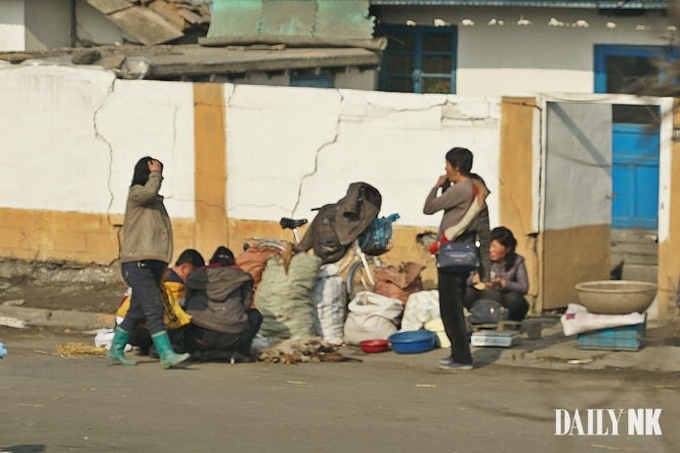November 26, 2025 | 14:43 GMT +7
November 26, 2025 | 14:43 GMT +7
Hotline: 0913.378.918
November 26, 2025 | 14:43 GMT +7
Hotline: 0913.378.918

North Korean sellers peddle goods on the fringes of a market in Sunchon, South Pyongan Province, in October 2018. (Daily NK)
Despite recent flooding in North Korea caused by heavy rains, the price of grain in North Korean markets has held fairly steady. The North Korean government appears to be drawing upon its emergency grain supplies to keep market prices down.
According to Daily NK’s regular market price survey, a kilogram of rice at a marketplace in Pyongyang on Aug. 4 was trading for 5,700 North Korean won, which was similar to a survey on July 21 (5,730 won).
The price of rice on the same day at a marketplace in Sinuiju, North Pyongan province was 5,800 won, or 60 won higher than the July 21 price (5,740 won).
However, the price of rice had fallen somewhat at a marketplace in Hyesan, Yanggang province. Rice was trading for 6,100 won at a market there on Aug. 4, down 200 won from the survey two weeks earlier (6,300 won).
The apparent reason that rice prices are remaining stable despite expectations that prices would rise after the flooding is because the authorities hastened to disperse rice reserves and wartime supplies to head off a spike in price.
According to a source in North Korea recently, a decision was reached during the 22nd Emergency Enlarged Meeting of the Eighth Central Committee of the Workers’ Party of Korea (WPK), on July 29–30, to release some of the rice reserves managed by the State Affairs Commission and emergency wartime supplies stored by the Korean People’s Army. Following that decision, food was distributed throughout the country.
The State Affairs Commission — which is chaired by North Korean leader Kim Jong Un and staffed by some of the country’s top officials, including the cabinet premier and the head of the WPK Organization and Guidance Department — is the highest decision-making body in the country. Since the State Affairs Commission’s rice reserves basically function as Kim’s emergency food supplies, they are reported to be much higher quality than the rice available for purchase at ordinary marketplaces.
But rather than providing the emergency rice to the public for free, the North Korean authorities are selling it for below market prices at state-run grain stores.
The current stability of rice prices at North Korean markets is a temporary matter resulting from the release of rice reserves and wartime supplies, and the price is likely to rise once that supply has been exhausted.
At the same time, the price of corn, which is a staple food for low-income earners, has been showing some upward pressure.
The Aug. 4 survey found that one kilogram of corn was selling for 2,600 won at a marketplace in Pyongyang, or 100 won higher than the price (2,500 won) in the July 21 survey. In Sinuiju, corn was trading for 2,750 won on Aug. 4, an increase of 220 won from two weeks earlier.
In a related development, the exchange rate of the North Korean won to the U.S. dollar has been rising since the recent flooding.
On Aug. 4, the North Korean won-to-dollar exchange rate at a Pyongyang market was 15,200 won, the highest it has been since North Korea’s 2009 currency reform. The won-to-dollar exchange rate increased by a similar amount in Sinuiju and Hyesan.
In contrast, the survey found that the exchange rate of the North Korean won to the Chinese yuan was lower than two weeks before. The decrease of the won-to-yuan exchange rate at North Korean markets is thought to be the result of a temporary decrease in demand for yuan trades given the disruption to North Korea-China trade caused by the flooding.
(Dailynk)

(VAN) A new study reveals how the simultaneous effects of ocean acidification, salinity and loss of oxygen are making the world more fragile.

(VAN) Hopes are growing that the creation of the first 3D turkey gut model could be a turning point in the battle against the virulent blackhead disease.

(VAN) Tyson, America’s biggest meat supplier, plans to shutter one of its largest beef processing plants as the industry continues to struggle with low cattle supplies and political pressure from Washington.

(VAN) New FAO study shows how digital solutions are empowering farmers and fishers to prevent losses and build resilient agrifood systems.

(VAN) Brazil's COP30 presidency pushed through a compromise climate deal on Saturday that would boost finance for poor nations coping with global warming but that omitted any mention of the fossil fuels driving it.

(VAN) Poultry farmers in the UK have been warned that they could face one of the worst winters yet for bird flu.

(VAN) Prices of main-crop paddy have risen sharply, with jasmine rice hitting 16,100 baht per tonne — the highest level in years.